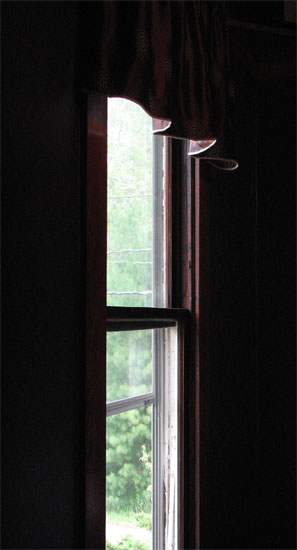The greasy dishes pile onto our long narrow table at the Thai restaurant in Queens. We are celebrating the college graduation of my cousin Jeffrey, sitting across from me; the 70th birthday of my father, sitting beside me; and the 60th birthday of my uncle, sitting at the opposite end of the table, where I prefer him. My brother, sister-in-law, and aunt and uncle from my mother’s side are here too. Another glass of wine is poured, and someone asks my uncle if he wants to say something. I realize this is his cue to make a speech. After sitting through much of the meal in silence, he lets out a frail voice in accented English, his cheeks pulled into a smile so forced, it must be sincere.
A family dinner with my uncle is a rare occurrence, even though he lives with my mother and father in the apartment where I was raised. He usually makes every effort not to be inside the house when my parents have dinner, perhaps because he thinks eating their food is the one burden he can spare them.

Evolution of an Illness
Since he came to live with us several years ago, my uncle’s presence has evolved from a crisis to a quiet nuisance. These days, he spends most of his limited energy trying to make himself easy to ignore. He takes long walks, returning late at night with his grim, loping gait. He sleeps most of the day. Or when he is anxious, he may lie awake in his dark room for hours on damp sheets.
In return for his efforts to imitate old furniture, my parents accept his sickness and accept he will not get better. That’s more than many in our family are willing to admit, as evidenced by the boxes of vitamins and herbal supplements that have piled up in his room, sent by other relatives with notes of courteous concern.
Though his presence is irksome, my parents know we’re relatively lucky, because my uncle’s illness is not the kind that leads to violent outbursts or deep hallucinations. For years, his medication simply deadened his mind into a state of near-catatonia, underscored by the 40-some-odd pounds he put on as a side effect of the drugs. His brain has limbered up somewhat recently since he started taking a different pill. But his other main symptom remains: his silence, the invasive hush hovering over the apartment like a quivering moth.
While the family’s social contract with my uncle has brought quiet resignation, his diagnosis has helped us make sense of him—more to our benefit than to his. Until then, no one quite knew why, for as long as anyone could remember, he had refused to show any degree of warmth toward other human beings. During his marriage, faint hints of the crisis surfaced at quickening intervals. My uncle’s wife sometimes confided in my parents about his cruel detachment and revealed how, contrary to his family’s hopes, marriage had failed to cure him of his coldness. Jeffrey grew up learning how to ignore and be ignored by his father.
Later, no one could explain why my uncle avoided my grandfather as he lay on his death bed, despite his wish to see his youngest son before expiring, as if a final visit would redeem some of the shame of not raising him right. He was the shame of a proud family that, despite having survived war and poverty and revolution, somehow just couldn’t fix this one ingrate son.
Finding a Language
We issued our own diagnosis first: guai, a catch-all Chinese phrase for weird, strange, and deviant. My parents chalked up his withdrawn nature to a mixture of apathy and a flawed personality. They tried to push him to be a better husband, to be more responsible and affectionate. But after the divorce and the loss of his dead-end office job, not too long after September 11, when he dissolved into babbling paranoia and refused to come out of his apartment for days, and soon had to be forcibly removed and committed to Bellevue… at that point, guai no longer sufficed.
There is a term for schizophrenia in Chinese, but it doesn’t carry the same currency as it does in English. Like the disease itself, it doesn’t translate well.
My uncle was more talkative when he first arrived from the hospital. Though the paranoia had eased by then, fear would well up in him at night, and he had a habit of jumping out of bed to kneel and pray for forgiveness before my grandfather’s framed photograph in the living room.
Between his convulsions of guilt, my uncle complained. His grumblings were as bland and monotonous as his spirit, but still they ground down my parents’ nerves. He griped about constant insomnia, or about feeling ill and weak with some un-diagnosable ailment. He pestered my parents to give him a job at their store, insisting this would relieve his restlessness. He worried that Jeffrey wasn’t doing all his homework, that Jeffrey’s hair was too long, that Jeffrey would catch a cold because he didn’t wear a hat, and that his mother wasn’t keeping a careful eye on him.
But no, when we asked him in exasperation, he wouldn’t call or meet with his son, or visit him at college. Just as he refused to change his pants or get a haircut. He deflected anger with blankness. Over time, the complaints ebbed into silence, and we didn’t miss his voice.
Today, the disturbance has calmed down to a low growl, the white noise we’ve all learned to block out. I often pass him on the street in my neighborhood and scarcely make eye contact, rather I let him fade into the city’s anonymous backdrop. Perhaps in another context this would be a sign of family dysfunction. But the dividend we extract from my uncle’s dependency is the convenient assumption that whatever is wrong with our collective relationship, it is always wrong with him.
My uncle has taught my family a new language of avoidance. My mother and father cope in creative ways. They assign him rote tasks: watering the plants or doing sit-ups before bed. At times, they seem to relish yelling at him—about his reluctance to shower and shave; his fatness; the sweat that beads up on his greasy forehead because he wears long sleeves and sweaters regardless of the weather; and how he eats the same dull breakfast every day, bread and milk, like he’s still institutionalized. With almost puerile vigor, they’ve teased him about his various tics—the tuneless humming under his breath when he chews, the involuntary muscle contractions rocking him back and forth and making him limply stroke his belly, as if strumming a guitar.
I no longer see the point in trying to convince my parents this kind of treatment is not very therapeutic for schizophrenia patients. I know it provides a cathartic outlet as they struggle to fit him into a half-lit corner of their lives. And I’m not entitled to criticize; I yell at him too sometimes, after all. And unlike them, I don’t have to breathe the stifling air his illness seeps into their home each day.
My mother sometimes lashes out with subtle hostility. Over dinner, she’ll yell at him for being too timid in reaching out for the fish on the far end of the table—she hates his craven reluctance to ask for anything, as if he’s afraid of becoming emotionally indebted to us. One night she denounced him for not visiting an ailing relative, reminding him of how he abandoned his own parents, and the withering denouncement prompted him to make the trip. Mostly, she rages against his less consequential tics: She’s excoriated him once for not throwing away the box for the tube of toothpaste. Normal people don’t leave open toothpaste boxes; they throw them in the trash. My uncle would generally say nothing and comply, but it isn’t the nonsensical habits that bothered her, but the indifference, the emotional opacity, that gives him an unnerving leverage over us.
My father focuses on keeping my uncle occupied. He urges him to write Chinese calligraphy each day as a form of therapy. Lately, my uncle has become somewhat livelier and talkative—we think it’s because he switched medications—and the recommendations have become more ambitious. My uncle now writes regular diary entries, which my father sometimes reads to monitor his progress. When my father encouraged his brother half-seriously to take martial arts classes with an old master we know from Chinatown, my uncle, who moves like he just emerged from a body cast, stayed quiet. He allows his caregivers the comfort of having urged him to do something, knowing they don’t expect, maybe don’t even want him to really respond.
The New Normal
There have been minor triumphs in recent months since he switched to the new medicine. He might remark at dinner on the food being too spicy, instead of just chewing mutely. He used to eat only bananas as his evening snack, and now he throws in the occasional apple or orange.
One evening, I asked my uncle if, after about five years, he had become the longest-running student in his day treatment group. He told us many people had been there far longer. My father joked about how long it was taking those students to “get better.” No, I say, it’s about managing the illness, reaching a point where it’s no longer getting worse. You still don’t understand you can’t cure these things, I said. They nod quietly, and my uncle says nothing. The lull dangles in our queer emotional stasis.
As a reporter, when writing about mental health issues, I’ve researched the concept of cultural competency. I’ve interviewed clinicians and advocates about Western mental health care’s failures in working with immigrant households, who often are reluctant to seek professional treatment and have difficulty grasping the idea there is no real cure. Researchers say Asian American families face special challenges due to different concepts of family cohesion, which tend to subjugate the individual will to the communal. Mental health issues in Asian American communities have historically been ignored or misunderstood, burdened by stigma, shame, and a lack of access to culturally sensitive treatment programs.
Still, I can never seem to graft that analysis onto the case study unfolding in my parents’ living room. We’re not ignorant people who think my uncle is cursed or evil. We’re not ashamed. Somehow the disdain my parents heap on him feels justified. He is irritating, unpleasant, and he is constantly there. Before he went crazy, he frustrated us in ways no one else really understood.
We may understand him better now that his personality bears a psychiatric label.
We understand ourselves less; my father’s unshakeable commitment to his brother seems to push the bounds of sanity at times, even if we couldn’t imagine it any other way. Maybe it runs in the family.
I go back to his birthday. Tonight, we rest. We’re at the Thai restaurant in Queens, two generations celebrating two birthdays and a graduation. Two middle-aged brothers face each other across the long table, balding and content. Tonight, my uncle toasts to his son Jeffrey.
He’s happy that everyone is together here, he says, and he’s proud.
I try to focus on his words and not the wheezy thinness of his voice as my mouth pulls into something just shy of a smile. Mired in the moment’s dense awkwardness is this fragile pride we all feel—an emotion pressed flat and smooth by exhaustion.

- Follow us on Twitter: @inthefray
- Comment on stories or like us on Facebook
- Subscribe to our free email newsletter
- Send us your writing, photography, or artwork
- Republish our Creative Commons-licensed content

